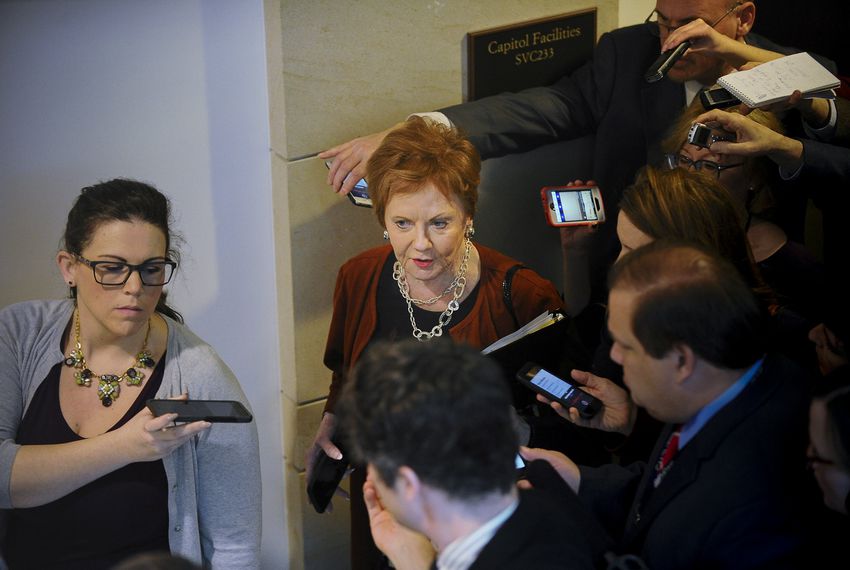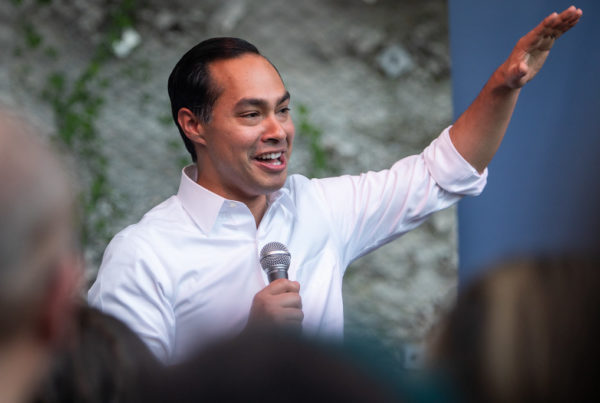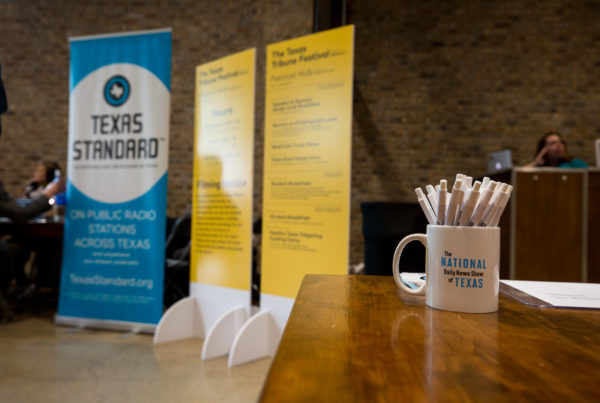From The Texas Tribune:
It’s the question on the minds of Republicans from Washington to Cowtown: Is one of Texas’ most powerful U.S. House members in political trouble?
Enough people think so that many in the GOP political class are bracing for Fort Worth to serve as the setting of the next nationalized battle between the party’s establishment and rebellious conservative factions.
U.S. Rep. Kay Granger, the ranking Republican on the House Appropriations Committee, is running for reelection in her Fort Worth district. But at least one well-funded primary challenger has emerged: Chris Putnam, who shot out of the gate this fall with a burst of cash and accusations that Granger is not sufficiently loyal to President Donald Trump.
Unseating Granger would undoubtedly be a tall task – she’s a 12-term member of Congress who has been a force in Fort Worth politics since before she was mayor in the early 1990s.
“I sure as hell wouldn’t want to run against her,” says state Rep. Charlie Geren, a Fort Worth resident and brother of the man Granger replaced in Congress.
But Granger, who is the only Republican woman representing Texas at the federal level and the most senior Republican woman in the House, has never faced a competitive Congressional race, leaving state and national Republicans to wonder how she will respond.
“Sometimes, sitting congresspeople have knuckleheads who run against them in primaries, who have no chance,” says former Tarrant County GOP Chairman Tim O’Hare, who lives outside the district but is supporting Putnam. “This is certainly not one of those. He certainly has a chance. He is far more popular among conservatives than she is.”
When Granger first ran for Congress in 1996, both parties courted her as a candidate. Since her election, she has served as a loyal Republican. But she is not a firebrand. In Washington, she has long been a quiet operator who concentrates on delivering for her city and district.
From her position on the Appropriations Committee, she spearheaded the development of the F-35 fighter plane, which is in part manufactured in Fort Worth’s Lockheed Martin plant, and a massive Fort Worth waterworks project called the Trinity River Vision Authority. Both the F-35 and the Trinity River project have come under heavy criticism for cost overruns. Granger has also withstood years of allegations that the TRVA, which has been run by her son J.D. Granger, is a source of nepotism.
A year ago, the Texas Republican delegation rallied behind her in a successful — but narrowly won — bid as the top Republican on the Appropriations Committee. The Appropriations Committee is where decisions are made on how the government spends money.
It is the most sought-after committee among members, and a leadership post like that of Granger’s is usually the capstone of a long Congressional career.
But her position on the Appropriations Committee cuts both ways. While she can argue that her status puts her in a unique position to help her district and Congress, she depleted her campaign accounts to get to that point.
As she vied for the role, she raised and distributed millions of dollars to House GOP efforts to win races elsewhere in the country. According to Federal Election Commission records, she has directly transferred over $3 million from her own campaign to the House GOP campaign arm since 2002. That sum does not include donations directly to colleagues and candidates, fundraisers she has hosted on behalf of colleagues and the National Republican Congressional Committee and money directly raised for the NRCC. Two Republicans who support Granger estimated the unknown sum to be millions more.
Once the top slot at the committee opened up, Granger escalated her fundraising, and that effort proved key in her victory last year. Now, as the ranking member, she has already transferred $435,000 to the NRCC this year alone.
Now, according to her most recent campaign filing, she has $563,000 in the bank – a paltry sum for a high-ranking member of Congress in a competitive election. In comparison, U.S. Rep. Henry Cuellar, D-Laredo, also has a primary fight on his hands and is readying to unleash $3.2 million against his rival.
Putnam, meanwhile, has shown some fundraising prowess so far. He entered the race on Sept. 24, and in the six days before the quarter closed, he walloped her in fundraising. By Sept. 30, he posted a haul of $456,000, though $250,000 of that was a loan he gave his campaign. Granger raised $284,000 over the entire quarter.
Putnam is from Colleyville, which is within the district lines of retiring U.S. Rep. Kenny Marchant. Instead of opting to run in that seat, which is a top Democratic general election target, Putnam is running in the 12th District. Colleyville neighbors the furthest northeast corner of Granger’s district lines. Putnam has beefed up his local bona fides by moving into the district and emphasizing his degree from Texas Christian University, which is in the district.
Putnam’s donors included a who’s who of Northeast Tarrant County conservatives, including retiring state Rep. Jonathan Stickland, R-Bedford, and conservative activist Julie McCarty.
Neither campaign made their candidate available for comment, but Putnam has made the rounds on local talk radio.
“Nobody’s really posed a credible primary challenge to her. …I think a lot of people have historically feared that incumbency,” Putman told Dallas-Fort Worth radio host Mark Davis.
Putnam is already hammering Granger on several fronts.
On national policy, he has publicly stated he will run to the right of her on abortion and immigration. He is also aiming to leverage her post at appropriations against her, arguing that even in the minority, she should have been able to deliver funding for Trump’s long-sought after border wall.
And then there is Panther Island, a water district within the larger TRVA plan. Putnam was not the first local to refer to the entire project as “a boondoggle,” as he told WBAP.
Most prominently, he has blasted her for her late 2016 criticism of Trump after the GOP presidential nominee was caught on tape lewdly discussing groping women. At the time, Granger called the comments “disgusting” and called on him to “remove himself from consideration as Commander in Chief.”
Putnam’s fundraising and early attacks have sparked worries in state and national politics that Granger was slow off the mark to recognize the challenge ahead of her. Her political operation, like many other Republicans in the delegation in cycles past, has had to undergo a modernization process. She has never been in a Congressional runoff. Her first race in 1996 was something of a coronation for the then-Fort Worth mayor. In fact, she never earned less than 70% in a primary in her races.
And her district is solidly Republican. Even in 2018, when U.S. Rep. Beto O’Rourke carried Tarrant County, Granger easily coasted to reelection with a near two-to-one victory over her Democratic rival.
But tallies like that can mask a political operation that proves rusty once challenged.
Signs of a political modernity — like robust social media campaign accounts — are scant. She was also lacking a full stable of political consultants on her most recent campaign finance report. Multiple Republican operatives told The Texas Tribune that Granger is in the midst of taking pitches from consultants to run the other aspects of her campaign but it is unclear how far along she is in that process.
There is also another potential complicating factor: Should any other well-funded Republican candidates smell blood and jump into the race, Granger would need to win a majority of the vote to avoid a runoff. Runoffs in Texas historically pose mortal threats to incumbents.
Given her stature in Washington, the ramifications of a Granger loss would be unlike any other member losing reelection. Most of her allies are not entertaining this scenario.
The Texas donor community has rallied behind her. Two top GOP bundlers, H. Ross Perot, Jr. and John Nau III, hosted fundraisers for her in recent weeks. But mostly, there is little sense of urgency within Fort Worth, according to interviews with several local political players.
And while Putnam tagged Granger as “a stranger” on social media, she’s a fairly common presence around Fort Worth.
Even Trump has seemed to back her up. Earlier in the month, Trump saluted Granger at a Dallas rally, calling her “a woman who’s fantastic who’s been a fan of ours right from the beginning.” And when Trump attended a World Series game in the nation’s capital last month, Granger was one of about a dozen lawmakers who joined him.
Disclosure: H. Ross Perot, Jr.; John Nau III; and Texas Christian University have been financial supporters of The Texas Tribune, a nonprofit, nonpartisan news organization that is funded in part by donations from members, foundations and corporate sponsors. Financial supporters play no role in the Tribune’s journalism. Find a complete list of them here.














